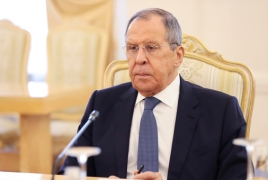
Following a meeting of the Council of Foreign Ministers of the Collective Security Treaty Organization (CSTO), Russian Foreign Minister Sergey Lavrov stated that the conflict surrounding the Armenian Apostolic Church must be resolved and that Russia is concerned about unwarranted attacks on the Church.
“We discussed the issue and expressed serious concern about what is happening in the Republic of Armenia. Of course, it is an internal matter for our neighbor, but attacks on the canonical, millennia-old Armenian Apostolic Church understandably raise deep concerns.
The Church has always been one of the cornerstones of Armenian society, and we would very much prefer that it not become the target of unfounded attacks—essentially without any serious grounds,” Lavrov told journalists, as reported by TASS.
Lavrov emphasized that the conflict must be resolved within Armenia’s constitutional framework. “We are interested in this situation being resolved as quickly as possible on the basis of Armenia’s Constitution, with full respect for the rights of believers and, generally, all human rights,” he said.
He also noted the existence of a “movement for the protection of the Church” within Armenian society, describing it as a significant development rooted in Armenia’s deep religious traditions.
Meanwhile, Armenia’s Foreign Minister Ararat Mirzoyan did not attend the CSTO meeting.
On the morning of June 25, law enforcement authorities conducted searches at the homes of supporters of the Sacred Struggle movement. The Investigative Committee accused the movement’s leaders and members of plotting to commit terrorist acts and seize power. Later, it was announced that Archbishop Bagrat, the movement’s leader, had been detained for two months along with 14 others.
On June 27, about 30 masked individuals raided the Shirak Diocese headquarters. Archbishop Mikael Ajapahyan, however, was in Etchmiadzin attending a clergy meeting. The NSS entered the premises to detain him. Although he initially agreed to go with authorities, a scuffle ensued, after which he and the Catholicos proceeded to the Catholicosate. He later appeared before the Investigative Committee and was also remanded for two months. He faces charges of inciting public calls to seize power, undermine territorial integrity, renounce sovereignty, or overthrow the constitutional order.

